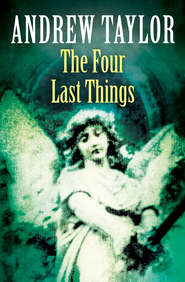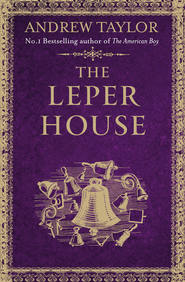По всем вопросам обращайтесь на: info@litportal.ru
(©) 2003-2024.
✖
The Fire Court: A gripping historical thriller from the bestselling author of The Ashes of London
Автор
Год написания книги
2018
Настройки чтения
Размер шрифта
Высота строк
Поля
‘Not yet, sir. In fact, I have not been there this afternoon.’
‘When you do, you will remember our conversation?’ Chelling put down the book he had been examining and took my sleeve. ‘About the Fire Court, and our difficulties with our bills? Not to mention with the authorities at the Inn.’
‘Of course.’ It occurred to me that this could be a fortunate encounter. If I could persuade Chelling to tell me what I needed to find out, it would remove the need for me to ask for Hakesby’s help – and, in return, to make him a loan that would leave me almost penniless. ‘Perhaps you would care to drink the King’s health with me?’ I said. ‘We might step over the way into the Devil.’
‘By all means, sir.’
Chelling bowed, which was not a success as he chanced to put his back foot on an uneven stone, which made him stumble. I caught his arm and steadied him. We crossed the road together with some difficulty, partly because of the traffic and partly because he was tottering along on two-inch heels. At the Devil, we went upstairs to the taproom. I ordered wine and found us a space at the end of a table at the back. The room was noisy – four law students were raising their voices in a ballad at the other end of the table, and two soldiers were arguing with passionate intensity about the disposition of the dragoons at an unnamed battle.
‘Have you known Mr Hakesby long?’ Chelling asked.
‘No, sir. Only since last year – the business at St Paul’s he mentioned.’
‘Of course – you told me earlier. What do you think of this so-called cousin of his, eh? Jane. Who did he say she was?’ Chelling stabbed his finger into my arm. ‘The sly old dog. Keeps him warm at night, I’ll be bound.’
I smiled politely. ‘It was civil of you to help me this morning,’ I said, trying to steer the conversation away from Catherine Lovett. ‘You mentioned this man Gromwell. I—’
‘Gromwell!’ Chelling burst out. ‘Always a maggot in his head about something. I cannot abide a man like that. We’ve all had our disappointments in life, but he bears his less gracefully than some I might mention.’
‘Have you known him long?’
‘Too long, sir. Far too long. I don’t want to be unchristian about any man, but I fear he gives himself airs, though with little justification. After all, we are both members. We are equals.’
‘Members …?’
‘Of Clifford’s Inn, sir.’ He paused as if to give time for me to digest the importance of this. ‘I was bred for the law, you see, though at present I assist them at the Fire Court. But I have lived in Clifford’s Inn for nigh on thirty years. Why, the Principal was good enough to say to me the other day that the place would be very much altered without me. But of course Gromwell is a Rule now, and by God he makes the most of it and carries himself very high with everyone. This business of the Fire Court is the perfect example. It’s not as if Staircase Thirteen is of any use to anyone else at – ah! Is that the wine?’
‘Staircase …?’
Chelling was watching the waiter. ‘Staircase Thirteen,’ he said absently. ‘I told you about it earlier. It’s not completely ruinous. The ground floor is perfectly weathertight, and the use of it would make it so much easier to store the Fire Court’s furniture and supplies and so on. As it is, we have to empty the hall when the court is not in session, so the Inn may have the use of it again. And that means – Dear Christ!’
The waiter was clumsy. The bottle tipped too far, and drops of wine spattered on the table.
‘Blockhead!’ Chelling snapped. ‘Numbskull!’
‘Beg pardon, masters, beg pardon.’ The waiter began to wipe the table.
‘Should we not drink His Majesty’s health at once, sir?’ Chelling said, seizing the bottle. ‘Loyalty to the throne demands no less. Allow me, sir.’
He poured the wine – hastily but without spilling a drop. We drank the King’s health, and then that of the other members of the royal family.
I set down my glass when we had drenched the monarchy in wine. ‘Are there many other gentlemen who are Rules?’
Chelling smiled, comfortably superior. ‘Clearly you were not bred to the legal profession,’ he said with a touch of pity. ‘In this Inn, there are twelve Rules under the Principal. Sometimes we call them the Ancients. They form the council that administers the affairs of the Society according to our statutes, as laid down by our honoured Founder.’
‘But your members are all lawyers, I take it – like those of the Temple, for example, or Lincoln’s Inn.’
‘The case is not quite identical, sir. We enjoy a different status. We are an Inn of Chancery, whereas such places as the Temple and Lincoln’s Inn are Inns of Court. In times past, our members were attorneys and solicitors who followed the Courts of the King’s Bench or Common Pleas. Or they were young gentlemen from the universities or from our grammar schools, who came here to gain a grounding in the law before moving to one of the Inns of Court. And it is the Rules who decide who shall enter our fellowship, and who shall be admitted to a set of chambers within the Inn. We—’
‘So Mr Gromwell is a lawyer?’ I cut in.
Chelling puffed out his cheeks. ‘I should hardly call him a lawyer.’ He paused to drink more wine. ‘One can hardly call him anything that’s worth the name. True, as a young man, he was admitted to the Society, so he may have some scraps of legal knowledge, but that’s all … He’s a man of fits and starts and idle fancies. He tried the law, and failed in that. He calls himself an antiquary, which means he fiddles about among dusty old papers and grubs about in ruined places and preys on the generosity of his friends.’
‘If he’s no lawyer, why is he here?’
‘A good question, sir.’ By now, Chelling was sweating profusely. ‘In the last fifty years, Clifford’s Inn has opened its doors to people our Founder would never have countenanced. Mr Gromwell’s uncle was once a Rule, and he spent a great deal of money refurbishing his chambers, as a result of which he was granted the right to bestow them on an additional life after his own. He chose to bestow them on his nephew.’
‘Number Three, on Staircase Fourteen.’
Chelling nodded but shot me a suspicious glance.
I said, ‘It seems most unjust, sir, that such a man should benefit by his uncle’s generosity, and in that way. And at the cost of others, too.’
‘Precisely.’ Chelling hammered his fist on the table, distracted from his suspicion. ‘One could hardly have come up with a less appropriate choice.’ He peered up at me, and wiped his brow with the trailing cuff of his shirt. ‘We live in terrible times. Since the great rebellion against his late majesty, nothing has gone right for this unhappy country. Or for Clifford’s Inn. We can’t get the students now. Not in the numbers we used to before the war. They go elsewhere. Before the war, I tell you, the Ancients would never have sunk so low as to elect a man like Mr Gromwell as a Rule. It beggars belief! He claims to have influence at court, but he has no more influence than’ – Chelling stamped hard on the floor – ‘than my shoe.’
During this last speech, Mr Chelling’s words had begun to take on a life of their own. They collided with one another. Consonants blurred, and vowels lengthened. Sentences proceeded by fits and starts.
My guest, I realized, was well on his way to becoming drunk on a mere bottle of wine. But perhaps this had not been the first bottle of the day. Or even the second. I doubted I would get anything useful about the Fire Court from him this afternoon. But at least he seemed happy enough to rant about Gromwell.
‘My father called at Mr Gromwell’s chambers last week,’ I said, attempting to seize control of the conversation before it was too late.
‘To see Gromwell? But why?’
‘He called there by mistake. I’m not sure that he saw Mr Gromwell at all.’
Chelling drained his glass and looked mournfully at the empty bottle. I raised my hand to the waiter.
‘Surely your father can inform you whether he did or not?’
‘Unfortunately he died on Friday.’
‘God bless us, sir!’ Chelling seemed to take in my suit of mourning for the first time. ‘How did it happen? It wasn’t plague, I hope, or—’
I shook my head. ‘An accident.’
‘The poor gentleman. We … we must drink to his memory.’
The second bottle came, and Chelling accepted a glass. His interest in my father had departed as rapidly as it had come, however, and we did not drink to my father’s memory. Instead, Chelling returned to the subject of Gromwell, and worried at it like a dog scratching a flea bite.
‘The trouble with Gromwell,’ he said, ‘is that he believes he’s a cut above the rest of us. He was born the heir of a fine estate in Gloucestershire. His father sent him up to Oxford but he frittered away his time and his money there. Then his father died, and the estate was found to be much embarrassed – every last acre mortgaged, I heard, and the land itself was in a poor state. To make matters worse, his brothers and sisters claimed their legacies by their father’s will, but there was no money left to pay them, so they all went to law against their brother. Gromwell is a fool, and fought them all the way rather than settle the business out of court. As a result he has nothing left but worthless old books and papers and a great heap of debts. I tell you frankly, sir, he has no more idea of how to manage his affairs than my laundrywoman.’
‘Then how does he afford to live?’
‘I told you: he’s a perfect parasite – he preys on his friends.’ Mr Chelling was still capable of relatively coherent thought, but his speech had now acquired an other-worldly quality, as if spoken with care by a foreigner who did not fully understand the meaning of the words or how to pronounce them. ‘Gentlemen he knew in his prosperity. He has friends at Court, and one of his schoolfellows is even a Groom of the Bedchamber. They say he’s quite a different man when he’s with them. Ha! No one could be more affable or obliging.’ He shrugged, a mighty convulsion of the upper body that almost dislodged him from the bench on which he sat. ‘He can make himself good company if he wishes, and he makes himself useful to them, too. He will find out their pedigrees for them, or keep them entertained with his conversation. In return, they lend him money and invite him to stay and lay a place for him at their tables. For all his airs, Lucius Gromwell is no more than a lapdog.’ Chelling glared at me and shook his fist. ‘Let him beware, that’s what I say. No man is invulnerable.’
‘That is very true, sir.’
‘Believe me, I shall make him laugh on the other side of his face before I’m done. I have the means to wound him.’











